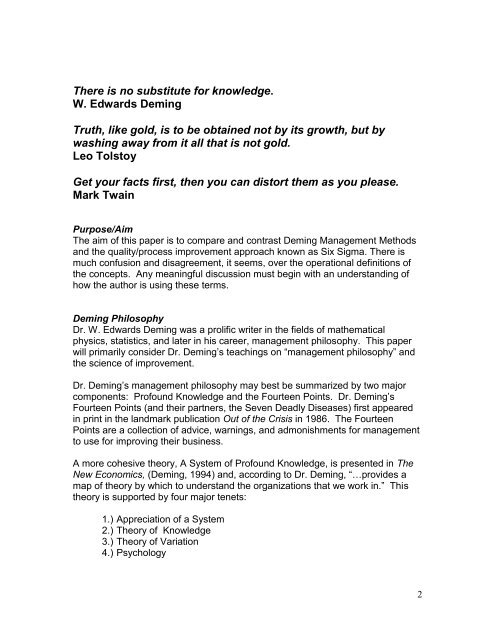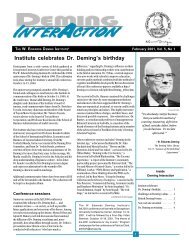Six Sigma, Through The Lens Of Dr. Deming's Philosophy And
Six Sigma, Through The Lens Of Dr. Deming's Philosophy And
Six Sigma, Through The Lens Of Dr. Deming's Philosophy And
You also want an ePaper? Increase the reach of your titles
YUMPU automatically turns print PDFs into web optimized ePapers that Google loves.
<strong>The</strong>re is no substitute for knowledge.<br />
W. Edwards Deming<br />
Truth, like gold, is to be obtained not by its growth, but by<br />
washing away from it all that is not gold.<br />
Leo Tolstoy<br />
Get your facts first, then you can distort them as you please.<br />
Mark Twain<br />
Purpose/Aim<br />
<strong>The</strong> aim of this paper is to compare and contrast Deming Management Methods<br />
and the quality/process improvement approach known as <strong>Six</strong> <strong>Sigma</strong>. <strong>The</strong>re is<br />
much confusion and disagreement, it seems, over the operational definitions of<br />
the concepts. Any meaningful discussion must begin with an understanding of<br />
how the author is using these terms.<br />
Deming <strong>Philosophy</strong><br />
<strong>Dr</strong>. W. Edwards Deming was a prolific writer in the fields of mathematical<br />
physics, statistics, and later in his career, management philosophy. This paper<br />
will primarily consider <strong>Dr</strong>. Deming’s teachings on “management philosophy” and<br />
the science of improvement.<br />
<strong>Dr</strong>. Deming’s management philosophy may best be summarized by two major<br />
components: Profound Knowledge and the Fourteen Points. <strong>Dr</strong>. Deming’s<br />
Fourteen Points (and their partners, the Seven Deadly Diseases) first appeared<br />
in print in the landmark publication Out of the Crisis in 1986. <strong>The</strong> Fourteen<br />
Points are a collection of advice, warnings, and admonishments for management<br />
to use for improving their business.<br />
A more cohesive theory, A System of Profound Knowledge, is presented in <strong>The</strong><br />
New Economics, (Deming, 1994) and, according to <strong>Dr</strong>. Deming, “…provides a<br />
map of theory by which to understand the organizations that we work in.” This<br />
theory is supported by four major tenets:<br />
1.) Appreciation of a System<br />
2.) <strong>The</strong>ory of Knowledge<br />
3.) <strong>The</strong>ory of Variation<br />
4.) Psychology<br />
2



